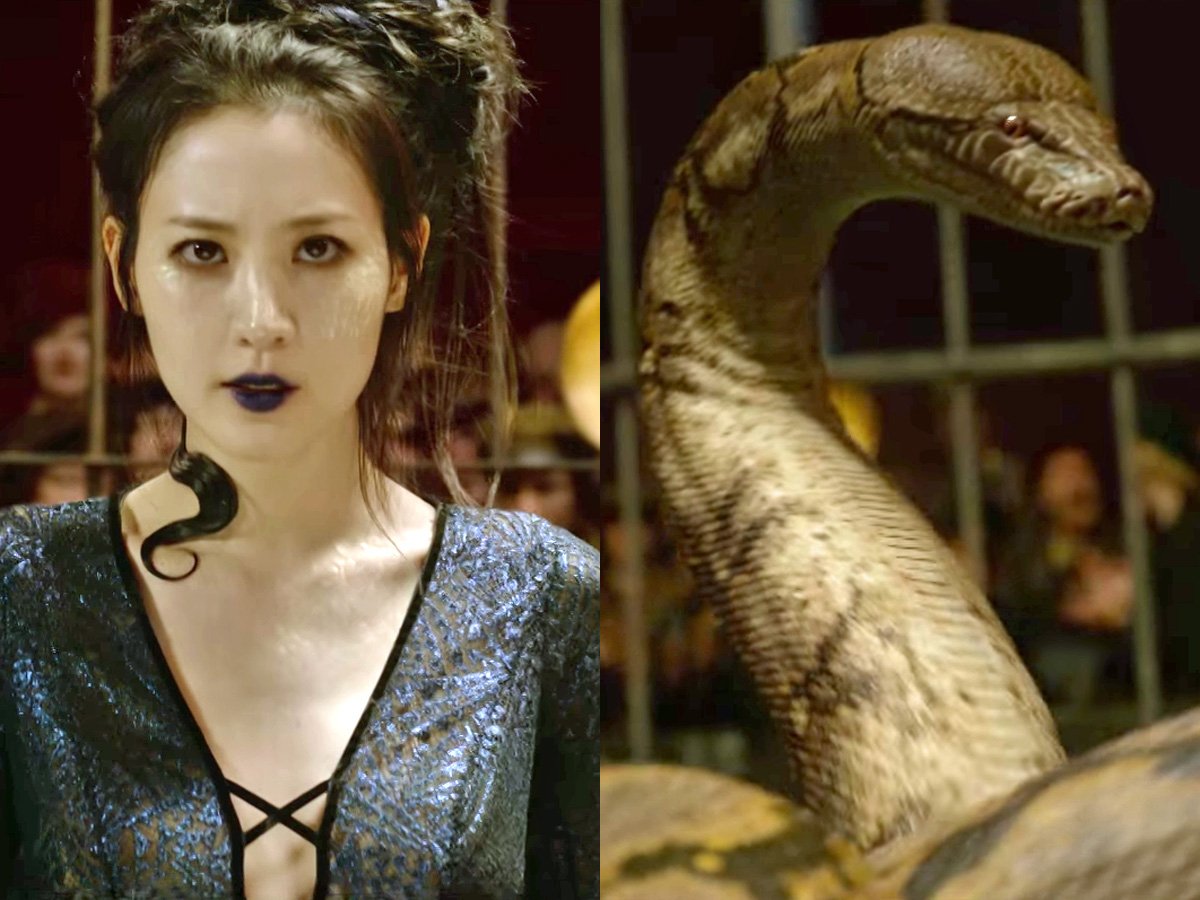Time to crack open a butterbeer, download duolingo for Parseltongue and become fluent in the speak of the snakes.
The “Fantastic Beasts: The Crimes of Grindelwald” trailer dropped, and it’s full of sizzling, fiery infernos of magic, cryptic creatures, the classic battle between good and evil and Voldemort’s infamous serpent sidekick, Nagini.
The trailer delved into Nagini’s past, showing a clip of a woman standing in a cage, as a crowd gazed intently at her every motion. Her pristine skin glows, the black color that is caked on her lips as striking as her demeanor. She is adorned in a dark, flowy gown, decorated with lace and dotted with scale-like speckles. The intense kohl lining her eyes becomes apparent as she shuts her eyelids and arches her back, in an almost reptilian movement. A slithering viper appears where she stood, its body a pool of earth-toned scales. Her transformation is complete. She hisses maliciously, displaying her forked tongue to the astonished spectators.
Nagini’s human form is portrayed by Claudia Kim, a South-Korean actress, and the public’s reception of this casting has been quite contentious.
These past few months have been momentous for Asian-American representation in Hollywood, with the all-Asian cast of the hit blockbuster “Crazy Rich Asians,” and Asian actress Lana Condor’s depiction of Lara Jean Covey in the beloved Netflix book-to-screen adaptation of “To All The Boys I’ve Loved Before.” The casting choices were largely well received for these two films, even garnering emotional responses from Asian-American individuals who were finally given the opportunity to see accurate representations of themselves and their experiences on a Hollywood screen. I’ll say it once, and I’ll say it again. Representation matters. A lot.
In the case of Nagini’s portrayal, however, viewers seem to feel that the casting decision was problematic. Some peg it as a racially insensitive choice, a feeble attempt at diversity gone awry by casting an Asian-American woman as a character that is subservient to a white male, Lord Voldemort. They feel that the casting choice was made just to fill a subconscious quota in the minds of the casting director: “Oh, here we have a minority actress as the snake, so our production can how be considered diverse.”
Others directed the attack at the creator of the Harry Potter World, J.K. Rowling. Twitter users disparaged her for trying to incorporate “representation as an afterthought,” in an attempt to compensate for an observed lack of diversity in the Harry Potter novels.
Yes, it is fair to point out that J.K. Rowling does seem to have a record for sliding in intentions of symbolic and implicit representation after the fact. For example, she claimed in 2016 that werewolf Remus Lupin’s condition was a wizarding world equivalent to “illnesses that carry a stigma,” such as HIV/AIDS. Lupin was attacked by a werewolf in his childhood, and the blood-borne nature of the condition transformed him into a werewolf as well. Over the course of the saga, it was apparent how he was cursed to suffer near the times of the full moon, when the condition was particularly dangerous and prevalent.
Not only does it seem like somewhat of an afterthought, coming so many years after the last Harry Potter book was released, but it also was seen as problematic that the condition of being a werewolf was equated with living with HIV/AIDs.
Viewers interpreted the Nagini’s casting decision similarly, as just an attempt to cover up lack of diversity with a last minute inclusion of a minority.
J.K. Rowling, however, had an answer prepared for the Twitter users who criticized her. She tweeted in response, “The Naga are snake-like mythical creatures of Indonesian mythology, hence the name ‘Nagini.’ They are sometimes depicted as winged, sometimes as half-human, half snake. Indonesia comprises a few hundred ethnic groups, including Javanese, Chinese, and Betawi. Have a lovely day,” closing it off with a snake emoji.
Indian author Amish Tripathi responded to Rowling’s post, enlightening her about how the “Naga mythology emerged from India. It travelled to Indonesia…with the influence of Indian traders…‘Nagin’ is a Sanskrit language world.”
Overall, a lot of the issue surrounding the casting of Nagini is centered around the fact that the snake’s character is a submissive creature associated with a villain, making it a racially insensitive decision to have a person of color placed in that role.
I can understand the roots of that mindset, but I feel like the situation is being drawn slightly out of proportion. Having an actor or actress portray a character associated with negative qualities does not and should not reflect anything about the actor or actress’s persona.
There is a token “bad guy” in almost every film, and he or she is usually portrayed by an actor or actress who is adored by the public. In fact, most actors and actresses are obviously not villainous people, yet are able to perform the roles of evil figures magnificently, which is a difficult task that requires mastery of the art. It’s called being good at your craft.
In this case, I don’t think the casting choice was meant to insinuate anything about Claudia Kim or concoct a warped, racially charged power dynamic. Kim was chosen for the role because she earned it through her talent and persistence.
Diversity should exist in every type of role. I think the issue of representation in Hollywood needs to be tackled from the angle that actors and actresses of color should be given the opportunity to showcase their talent in a diverse array of roles.
Actors and actresses are essentially masters of deceit. The best actors and actresses are the ones that can most successfully convince the audience that they are a whole new person or entity, no matter who that character may be. The job description is centered around being able to harness diversity of perspective and craft various characters who embody different, unique stories.
And finally, shouldn’t the actress herself have some say in this conversation? Kim has not released any public statements regarding the controversy at hand, but she has expressed her excitement for the chance to play this serpentine role. Kim is enthused to portray Nagini as “a wonderful and vulnerable woman who wants to live. She wants to stay a human being.” Fans should show her more support in her excitement, rather than making the contrived controversy the bigger deal of the two.
I fully believe in Kim’s ability to forge a wickedly beautiful interpretation of Nagini’s character.

















